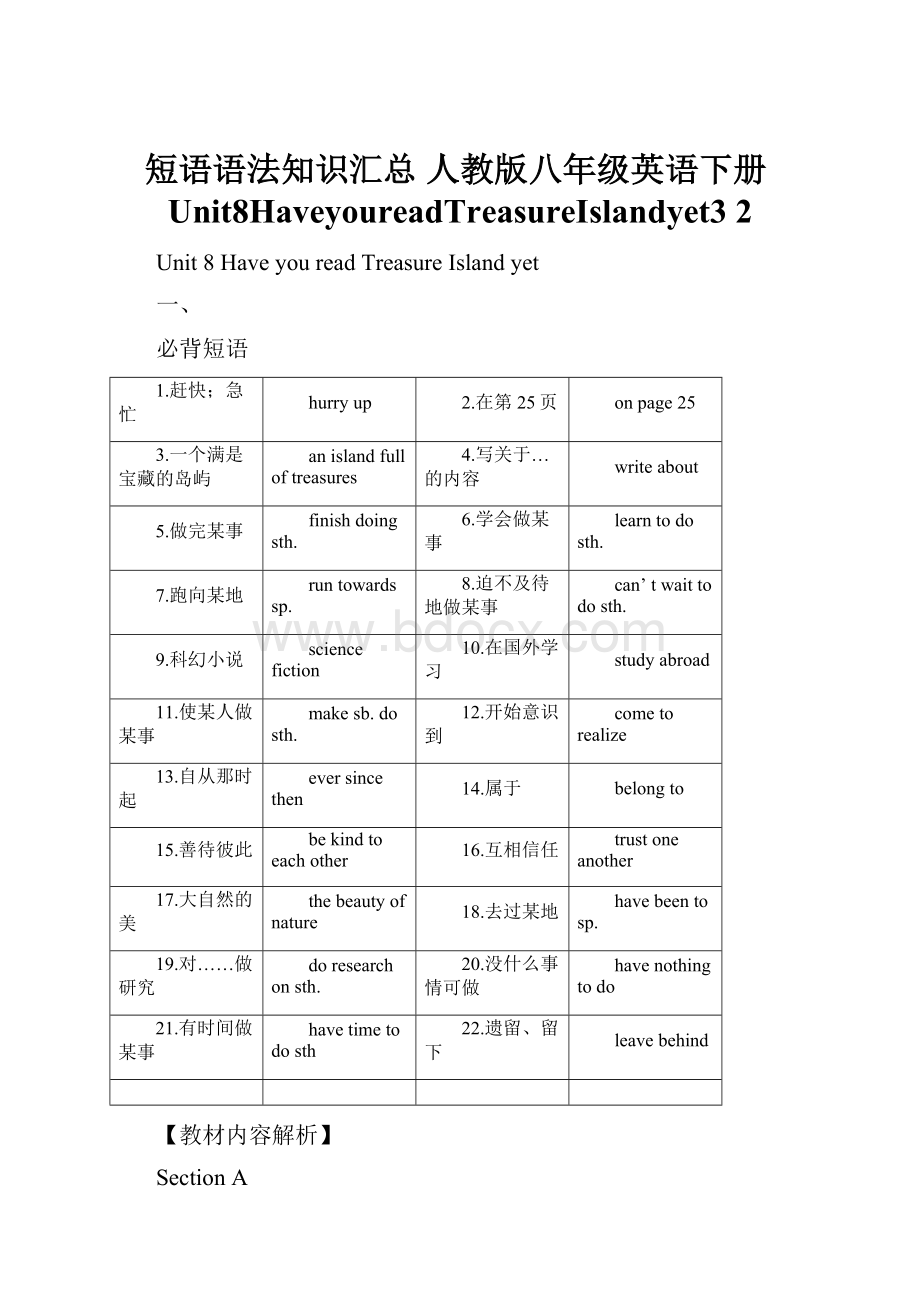短语语法知识汇总 人教版八年级英语下册Unit8HaveyoureadTreasureIslandyet3 2.docx
《短语语法知识汇总 人教版八年级英语下册Unit8HaveyoureadTreasureIslandyet3 2.docx》由会员分享,可在线阅读,更多相关《短语语法知识汇总 人教版八年级英语下册Unit8HaveyoureadTreasureIslandyet3 2.docx(21页珍藏版)》请在冰豆网上搜索。

短语语法知识汇总人教版八年级英语下册Unit8HaveyoureadTreasureIslandyet32
Unit8HaveyoureadTreasureIslandyet
一、
必背短语
1.赶快;急忙
hurryup
2.在第25页
onpage25
3.一个满是宝藏的岛屿
anislandfulloftreasures
4.写关于…的内容
writeabout
5.做完某事
finishdoingsth.
6.学会做某事
learntodosth.
7.跑向某地
runtowardssp.
8.迫不及待地做某事
can’twaittodosth.
9.科幻小说
sciencefiction
10.在国外学习
studyabroad
11.使某人做某事
makesb.dosth.
12.开始意识到
cometorealize
13.自从那时起
eversincethen
14.属于
belongto
15.善待彼此
bekindtoeachother
16.互相信任
trustoneanother
17.大自然的美
thebeautyofnature
18.去过某地
havebeentosp.
19.对……做研究
doresearchonsth.
20.没什么事情可做
havenothingtodo
21.有时间做某事
havetimetodosth
22.遗留、留下
leavebehind
【教材内容解析】
SectionA
1.OliverTwistisaboutaboywhogoesouttoseaandfindsanislandfulloftreasures.(P.58)
full作形容词,表示“满的、充满的、饱的、完全的”,befullof意为“充满……”,相当于befilledwith。
翻译:
房间里装装满了人。
________________________________________________________
2.Itisaboutfoursistersgrowingup.(P.58)
growup表示“长大、成长”。
例句:
IwanttobeafootballplayerwhenIgrowup.
3.Haveyouatleastreadthebackofthebooktoseewhatit’sabout?
(P.58)
see此处表示“明白、理解、意识到”,后接宾语从句。
例句:
Ican’tseewhyheisunhappy.
4.Youshouldhurryup.(P.58)
hurryup意为“赶快、急忙”,inahurry表示“匆忙地、很快地”。
例句:
Hurryup,oryouwillbelateforschool.
翻译:
Theywenthomeinahurry.________________________________________________
5.Thebookreportisdueintwoweeks.(P.58)
(1)due用作形容词,表示“预期、定期”,通常只用作表语。
翻译:
WhenisthetrainduetoarriveinBeijing?
_______________________________________________
(2)“in+一段时间”意为“多久之后”,常与一般将来时连用。
翻译:
我们将会在一小时后回来。
______________________________________________
6.Whoelseisonmyisland?
(P.59)
else此处是副词,意为“另外地、其它”,常置于疑问词或不定代词之后。
翻译:
你还想要什么?
Whatelsedoyouwant?
____________________________________
【拓展】辨析else和other
else是副词,修饰疑问词或者不定代词,置于之后;other作形容词,修饰名词,置于之前。
例句:
Whoelsegoeswithus?
例句:
Whatotherthingscanyousee?
7.Howlonghavetheybeenthere?
(P.59)
翻译:
____________________________________________________________
howlong用来询问时间,表示“多长时间”,通常用for或者since来回答。
---Howlongdoesittaketofinishyourhomework?
---Forabout30minutes.
8.Oneofthemdiedbuttheotherrantowardsmyhouse.(P.59)
towards用作介词,表示“朝、向”。
翻译:
当我遇见他的时候,他正朝镇里走去。
______________________________________________________________________
9.Apieceoflandinthemiddleofthesea(P.59)
inthemiddleof表示“在……中间”,可以指时间或者空间。
例句:
Jowasstandinginthemiddleoftheroom.
10.Signsleftbehindbysomeoneorsomething.(P.59)
leavebehind表示“遗留、留下”。
翻译:
Shedoesn’twanttoleaveanythingbehind.______________________________________
11....shecan’twaittoreadthem!
(P.60)
waitforsb./sth.“等待某人或者某事”
翻译:
我们正在等待着考试结果。
_______________________________________________
waittodosth.“等待做某事”
翻译:
所有乘客正等待着上公交车。
_____________________________________________
can’twaittodosth.“迫不及待做某事”
翻译:
Thechildrencan’twaittorushoutaftertheclassisover.
________________________________________________
SectionB
1.TheTomsmustbepopular.(P.61)
must此处表示“一定、肯定”,表示肯定的推测,否定推测用can'tbe“一定不”。
翻译:
Sammustbenearly90yearsoldnow.
2.Shecametorealizehowmuchsheactuallymissedallofthem.(P.62)
(1)cometodosth.意为“渐渐……、终于……”,常与realize,know,like,understand等连用。
翻译:
Ittookmeoneyeartogettoknowhim.
(2)actually表示“事实上”,相当于inafact或者asamatteroffact。
翻译:
Actually,Idon’tthinkIwanttogoouttonight.
3....suchastheimportanceofmoneyandsuccess,butnotaboutbelongingtoagroup.(P.62)
belongto意为“属于、归属”,后接名词或者人称代词宾格作宾语。
翻译:
这辆自行车属于我妹妹。
___________________________________________________
4.However,countrymusicbringsusbacktothegoodolddayswhenpeoplewerekindtoeachotherandtrustedoneanother.(P.62)
oneanother意为“互相”,相当于eachother。
翻译:
Oursonsaredifferentfromeachother.
5.★Sarahhasn’tbeentoNashvilleyet,butitisherdreamtogothereoneday.(P.62)
(1)“have/hasbeento+地点名词”表示“去过某地”,表示某人的一种经历,说话时已不在那个地方,常和once,twice,never,ever等连用。
当地点为副词时,则要省掉no。
---Wherehaveyoubeen?
你去哪儿了?
---I’vebeentothepostoffice.我去邮局了。
(人已不在邮局)
翻译:
---你曾去过上海吗?
___________________________________________________
---没有,我从来没有去过那儿。
__________________________________________
【拓展】“have/hasgoneto+地点名词”表示“去了某地”,说话时某人已离开此地,在去某地的路上、已在某地或在回来的路上,所以此句型常用于第三人称,不能与时间状语once,twice,never,ever等连用,也不能和for以及since构成的短语连用。
---WhereisSimon?
西蒙在哪儿?
---HehasgonetoAustraliawithhisfamily.
他和家人一起去澳大利亚了。
(人已不在这儿,在去澳大利亚的路上、已在澳大利亚或从澳大利亚返回的途中)
助记have/hasbeento,have/hasgoneto意不同,两者用法当分清。
have/hasbeento+地点,“曾经去过某地”行;
have/hasgoneto+地点,“已去某地”人无踪。
“have/hasbeenin+地点名词”表示“在某地待过(多久)”,常与表示一段时间的状语连用。
例如:
Mr.BrownhasbeeninShanghaiforthreedays.布朗先生来上海已经3天了。
WehavebeeninChinasince5yearsago.我们自从5年前就来中国了。
HowlonghaveyoubeeninNewYork?
你在纽约多久了?
(2)辨析:
someday与oneday
someday
指“将来的某一天”,常用于将来时
IhopeIcanbeateachersomeday.
oneday
可以表示“将来的某一天”,作此意讲时,可与someday互换;另外它还可表示“某一天”(常用于故事的开头),常与过去时连用
Wewanttovisitthemoononeday/someday.
Oneday,athiefwascaughtstealingintheshop.
6.Ihopetoseehimsingliveoneday!
(P.62)
live此处用作副词,表示“现场直播、现场演出”。
TFBOYSisplayingliveinShanghaitonight.
7.Haveyouintroducedthissinger/writertoothers?
(P.63)
introduce...to...表示“把……介绍给……”。
Tomintroducedhisgoodfriend,Nancy,tomeathisbirthdayparty.
★★★【语法讲解】
现在完成时
(1)
1、现在完成时的定义:
表过去发生的某一动作对现在造成的影响或结果。
表示从过去开始一直持续到现在,也许还会继续下去的动作或状态。
2、现在完成时的定义:
构成
现在完成时是由“助动词have(has)+动词的过去分词”构成。
助动词说明该谓语是属于现在时范围。
它和主语的人称、数要保持一致。
过去分词是主要的谓语动词,说明句子的意义。
例句:
Hehasalreadyfinishedhishomework.他已经做完作业了。
Hehasn'tfinishedhishomeworkyet.他还没有做完作业。
---Hashefinishedhishomeworkyet?
他已经做完作业了吗?
---Yes,hehas./No,hehasn't.是的,做完了。
/不,还没有。
3、现在完成时的用法
表过去发生的某一动作对现在造成的影响或结果。
---Wouldyoulikesomebread?
你想要一些面包吗?
---No,thanks.Ihavehadmybreakfast.不,谢谢,我已经吃过早饭了。
(对现在的影响:
不饿)
---Whydon'tyoudrivetoyouroffice?
你为什么不开车去办公室啊?
---Becausemycarhasbroken.因为我的车坏了。
(对现在的影响:
车没办法开了)
表示从过去开始一直持续到现在,也许还会继续下去的动作或状态。
HehasstudiedEnglishfor6years.他已经学习英语六年了。
MaryhasbeenbusysinceshecamebackfromHangzhou.自从从杭州回来,玛丽一直在忙。
4、常和现在完成时连用的时间状语
用副词already和yet。
already一般用于肯定句中,yet一般用于否定句和疑问句中。
Wehavealreadyfinishedourhomework.我们已完成作业了。
Theyhaven'tfinishedtheirhomeworkyet.他们还没有完成作业。
用ever“曾经”和never“从未”。
它们多用于否定或疑问句中。
HaveyoueverbeentotheGreatWall?
你曾经去过长城吗?
IhaveneverbeentotheGreatWall.我从未去过长城。
用表示到说话为止的过去时间状语,如just,before,uptonow,sofar,untilnow,inthepastfewyears等。
Ihaveseenherbefore,butIcannotrememberwhere.我以前见过她,但记不起在哪里见过。
Hehasbeentherethreetimesinthelastfewdays.近几年他去过那里三次了。
用for+一段时间,since+时间点。
I'velivedherefor15years.我已经在这里住十五年了。
I'velivedheresince15yearsago.自从十五年前我就住在这里了。
Mr.GreenhasworkedheresincehecametoChina.自从来到中国,格林先生一直在这里工作。
Unit10I’vehavethisbikeforthreeyears
二、
必背短语
1.目前;现在
these days
2.迄今;到现在为止
so far
3.需要
in need
4.不再……
not…anymore
5.察看;观察
check out
6. 棋类游戏
board games
7. 初级中学
junior high school
8.不再;不复
no longer
9.清理
clear out
10.说实在的
to be honest
11.进行庭院拍卖会
have a yard sale
12. 勾起甜美的回忆
bring back sweet memories
13.将……认为
regard…as
14.玩一会儿
play for a while
15.处置;处理
do with...
16.找工作
search for work
17.依据;按照
according to
18.依……看
in one’s opinion
19.决定做某事
decidetodosth
20.在某处待了多久
havebeenin+地点
21.过去常常做某事
usedtodosth
【教材内容解析】
SectionA
1.Amywantstokeepheroldthingsbecausetheybringbacksweetmemories.(P.73)
bringback在句中意为“使……回忆起”。
Yourarticlebringsbackhappymemoriestome.
2.Youcanalsogiveoldthingsawaytopeopleinneed.(P.73)
inneed意为“需要”,在句中作后置定语。
Afriendinneedisafriendindeed.
3.Andcheckoutthesesofttoysandboardgamesforyoungerkids.(P.74)
checkout意为“查看、核查”。
Imadeaphonecalltocheckouthisaddress.
4.Wehavealreadyclearedoutalotofthingsfromourbedrooms.(P.75)
clearout意为“清理、丢掉”,代词作宾语时,要放在两者之间。
Theshelfinyourroomisoldanduseless.Clearitout.
5.Wehavedecidedtoeachsellfivethingsthatwenolongeruse.(P.75)
nolonger意为“不再”,相当于“not...anylonger”多用于表示状态或延续性的动词连用,强调从时间上说不再做某事;nomore/notanymore则表示动作不再重复出现,强调从程度上来说不再做某事。
Henolongersmokes.=Hedoesn’tsmokeanylonger.
Icannomoreeat.=Ican’teatanymore.
6.Forexample,hehasownedatrainandrailwaysetsincehisfourthbirthday,andheplayedwithitalmosteveryweekuntilhewasaboutseven.(P.75)
own此处用作及物动词,表示“拥有、有”。
Manymorepeoplenowowntheirownhomes.
7.Mydaughterwasmoreunderstanding,althoughshealsofeltsadtopartwithcertaintoys.(P.75)
partwith意为“放弃、交出”,后接名词或者代词作宾语。
Shehadtopartwithherpetcatwhenshewentabroad.
8.Asforme,Ididnotwanttogiveupmyfootballshirts,but,tobehonest,Ihavenotplayedforawhilenow.(P.75)
(1)asfor意为“至于、关于”,用于连接前面所谈论的内容,并转入一个新的话题。
Asfortheman,Iknownothingabouthim.
(2)tobehonest意为“说实在的、说实话”,在句中用作插入语,相当于totellthetruth。
Tobehonest,Idon’tlikeyournewdress.
9.JimhasbeeninJapanforthreedays.(P.76)
“have/hasbeenin+地点名词”表示“在某地已经多长时间了”。
IhavebeeninJinanfortwoyears.
SectionB
1.Somepeoplestillliveintheirhometown.However,othersmayonlyseeitonceortwiceayear.(P.78)
some...others...意为“一些……,另一些……”。
Somestudentsareplayingbasketballintheplayground,andothersareswimming.
2.Nowadays,millionsofChineseleavethecountrysidetosearchforworkinthecities.(P.78)
searchfor意为“搜寻、寻找”,相当于lookfor。
Thepolicearesearchingforthatman.
3.AmongtheseisZhongWei,a46-year-oldhusbandandfather.(P.78)
辨析:
between与among
between
一般指“在两者之间”
SheissittingbetweenLucyandLily.
她正坐在露西和莉莉之